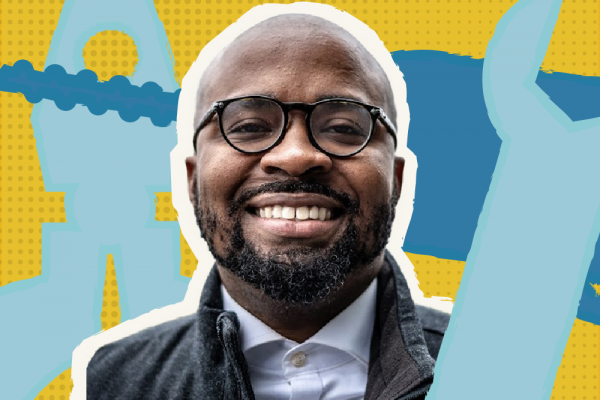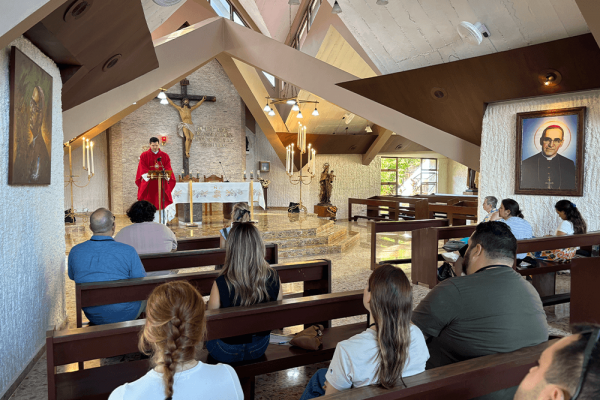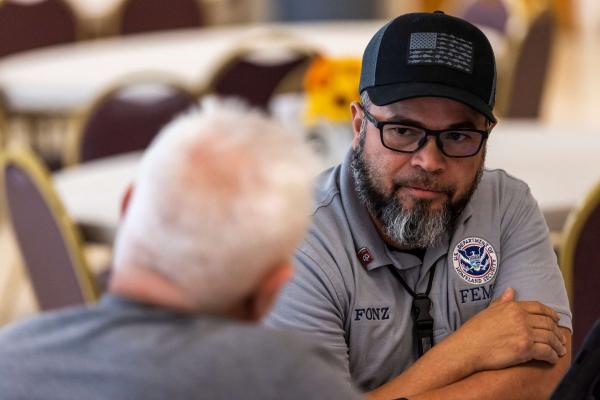With less than 50 days until the last day to vote in this election, we are entering into the final sprint of what feels like the most consequential election certainly in my lifetime. Sojourners has long warned of the danger of narrow, single-issue voting, advocating instead that Christians should vote all of their values across a broad range of issues. But as Rev. Jim Wallis argued so well last week, we believe that racism is the central religious issue in the upcoming election. Of course, even referring to racism as “an issue” feels inappropriate because the pernicious and pervasive impacts of racism collide with every issue at stake in this election. That is why, between now and the final day of voting on Nov. 3, we will examine in greater depth a range of key issues through the lens of race. We hope and pray that this motivates you to vote up and down the ballot — from local school board races to district attorneys to congressional candidates and, of course, president of the United States.
While applying our faith and biblical principles to political choices can be both messy and challenging, what should unite us as Christians is who we prioritize when we enter the voting booth. From God’s requirement to “act justly, love mercy, and walk humbly with our God” (Micah 6:8), to Jesus’ overriding ethic to care for those in need and to liberate the oppressed (Matthew 25 and Luke 4), the gospel is crystal clear that our first order priority as Christians is to protect and uplift people in the most vulnerable circumstances and most marginal places. This standard applies to how we live and to how we participate in public life, including how we vote. In every election, we must identify and carry with us the modern-day widows, orphans, immigrant people, and the disinherited. We must ask how candidates for every public office will defend and prioritize them while advancing the common good.
The moral responsibility of voting
In a democracy, even in one that is as flawed as our own, voting is an imperative for faithful citizenship and Christian discipleship. It is both a weapon for how we combat injustice and a renewable resource for how we restrain evil and advance the common good. Voting is also about accountability. As civil rights leader Cesar Chavez once said, “The day will come when the politicians do the right thing by our people out of political necessity and not out of charity or idealism.”
Abdicating this civic right and religious responsibility dishonors those who fought so hard for it and jeopardizes our very future. For those of you who are disillusioned with your choices, remember that a non-vote is actually a vote for the status quo. We are always faced with imperfect choices, and the kingdom of God is never squarely on the ballot. But we must use our spiritual discernment and prudential judgment to choose candidates who we believe most share our values, embrace our priorities, and will be best able to implement policies that prioritize those in need.
Faithful voting reflects a combination of our understanding of the candidate’s positions on important issues, your sense of their character, and their history of accomplishments. Voting can’t be reduced to a purely transactional exercise based on self-interest. Integrity and truth-telling, empathy and compassion, courage and conviction — these traits matter. So do experience and accomplishments, either in or out of office, because they provide a window into what a candidate will likely do if elected.
When we say the upcoming election is the most consequential election in our lifetime, it is not hyperbole or political spin, but a reflection of the perilous nature the crises that our communities, our nation, and our world face — the dual pandemics of COVID-19 and systemic racism, the ongoing crisis of climate change, the deep erosion in public trust and alarming levels of polarization, and staggering levels of inequality and poverty. We must resist an “us versus them” politics and embrace a broader “we,” committing to advance the common good. Groundbreaking polling and research by More in Common finds that a majority of Americans, which they refer to as “the exhausted majority,” are fed up with America’s deep polarization and yearn for politicians who are solutions-oriented, reject incivility and zero-sum politics, and emphasize the ways in which we have more in common than what divides us.
Sojourners’ mission rests on three core pillars: economic and racial justice, life and peace, and environmental stewardship. We hope that these pillars can provide a practical roadmap in the midst of this contentious election. First and foremost, as it relates to faithful citizenship, that means whether all citizens will have the opportunity to vote in a free, fair, and safe election is of central concern. As we've written over the years, it is an assault on the imago dei, the image of God in each and every one of us, to attempt to suppress even one person's vote. In this time of pandemic that has already claimed nearly 200,000 lives in the United States, we should be making it easier to vote safely, not harder.
A racial and economic reckoning
The ongoing COVID-19 pandemic hangs over the entire 2020 election like a thick and unrelenting fog. By the time of Election Day, the nation will be approaching a staggering 250,000 deaths from the virus. We need leaders who can provide bold, science-driven direction to combat the virus, care for those in the most vulnerable conditions, and foster an economic recovery that leads to a radically more just and equitable new normal. We need leaders committed to calling forth our sense of communal responsibility to protect ourselves and our neighbors by wearing masks and practicing social distancing for as long as is deemed necessary. We also need leaders who understand our moral responsibilities and practical interdependence with the rest of the world, which requires global leadership in the fight against the COVID-19 pandemic. Alarmingly, due to the pandemic and global recession, the World Bank estimates that 40-60 million additional people will fall into extreme poverty in 2020 and the Gates Foundation estimates that the pandemic has set back global health and the Sustainable Development Goal agenda by 25 years.
In the midst of our nation's ongoing and long overdue racial reckoning, we should support leaders who understand how centuries of structural racism affect every facet of our economy and society — and who have concrete plans to redress these injustices. The pandemic of racial police violence and systemic racism will require elected officials who are committed to more than simply cosmetic or incremental reforms to policing and criminal justice. We need leaders who are willing and able to ensure equal justice under the law applies to Black lives and who support both bold reforms and real transformation.
To give just one example, it's important to understand the influence wielded by district attorneys, sheriffs, judges, mayors, and members of town and city councils to control how public safety and policing are conducted in our communities. We should be keenly attentive to the impact candidates and ballot initiatives are likely to have on the protection of Black lives specifically.
Of course, issues of racial equity stretch far beyond policing and criminal justice and into education, employment, health care, and so much more. There is an integral connection between racism and poverty that should inform how we think about economic justice, which in turn should heavily influence how we vote. We should scrutinize policies and policy makers to ensure that the solutions they propose to the immediate economic crisis most benefit those who have the least, rather than exacerbating the existing inequalities that were already getting worse before COVID-19. The 2,000 verses in the Bible proclaiming God's justice for the poor and the oppressed demand to be taken seriously by Christians when they step into the voting booth. The exercise of this civic duty cannot be divorced from the tangible impacts officeholders and their policies have on the advancement of racial and economic justice or the furthering of injustice and oppression. And we must elect leaders who will end inhumane detention, reverse mass deportations, and are determined to finally pass bold, just, and effective reforms that provide a permanent solution — and do not discriminate against Black, Indigenous, and people of color — for DACAmented people and enabling over 11 million undocumented men, women and children to pursue a path to citizenship.
How we do life together
We believe that Christians are called to support and protect the life and essential dignity of all of God's children through every stage of life, no exceptions. That means the lives of children separated from their parents at the border, regardless of citizenship, are worth no less than lives in the womb. Abortion is so often used as a political wedge; instead, we can support leaders who are committed to working together to dramatically reduce the number of unwanted pregnancies through common ground solutions, such as increasing access to health care, ensuring access to affordable child care, and enhancing reproductive health. Protecting life means opposing capital punishment and supporting active peacemaking to prevent armed conflict. It means taking weapons of war off of our streets and keeping them away from our schools. It means supporting gender equity and justice and supporting policies that end domestic and sexual violence.
It’s important to note again that people of color are affected by each and every one of these threats to life and peace disproportionately, both in the United States and around the world.
Protecting the future
When we vote, we are making decisions ranging from which member of the town council supports initiatives to ensure clean drinking water for people in low-income housing to which candidate supports international treaties to combat climate change. It also means examining candidates and policies to determine who will protect the land and water rights of Indigenous people from multinational corporations. The stain and sin of racism are very much present in these issues as well, as we see egregious examples of environmental racism from contaminated water in Flint to lead paint in Baltimore. We're seeing increasingly dire consequences of our changing climate already; science tells us the worst impacts are still ahead of us — and we are running out of time to avoid catastrophe. That’s why we must support politicians who offer bold leadership to combat climate change and advance environmental justice.
Just before the 2016 election, Congressman John Lewis said, “the right to vote is precious, almost sacred. It is the most powerful nonviolent tool or instrument in a democratic society.” We must all not only utilize this powerful tool, we must use it wisely so that together we elect leaders capable of and committed to advancing liberty and justice for all and transforming our nation’s broken politics.
Got something to say about what you're reading? We value your feedback!






